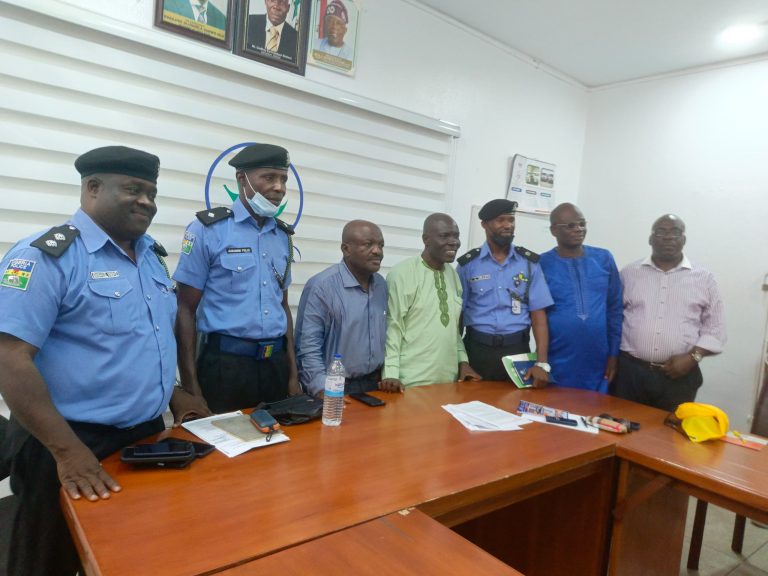Uncategorized
‘Rush To Break News Can Lead To Brush With Cybercrime’- Police

…Says Journalist Right To Occupational Inquiries Not Impeded
BY EGUONO ODJEGBA
Nigerian Police expert in cybercrime acts has advised journalists to engage in less haste in breaking news development, saying unwarranted rush often leads to brushes with aspects of the cybercrime laws; also resulting in accusations of cybercrime offences against journalists.
Collaborating, a media expert also urged Nigerian journalists to remain professionally vigilant and thorough in their reportage of news to avoid falling victim of the Cybercrime Prohibition, Prevention and Enforcement Act of 2015.
The experts who were speaking at a one-day workshop on the effects of cybercrime administration on the media organized for journalists by the Maritime Reporters Association of Nigeria (MARAN) on Thursday, October 10th, 2024, in Lagos, explained that journalists must seek a safeguard between news reporting and criminal trespass on citizens and or legal entities.
According to SP Abubakar Smart, the Acting Assistant Director of the Nigeria Police Force, National Cybercrime Centre, while the power of the media is strong and incisive in holding society, people and office holders accountable, journalists he says should also ensure that their reports does not infringe on the integrity of anyone which can get them into trouble, by way of litigations and possible conviction.
“What strikes the mind of people when we talk of cybercrime is internet fraud but it is more than that. Today, it has become a global threat due to the way we use digital technology, the nature of our work and the way we interact online.
“Journalists need to be well-informed about the Cybercrime Act of 2015, as amended, to be more educated about cybercrime so as not to fall victim.”
Smart described cybercrime as any criminal activities done on the cyberspace on any social media platform, which includes cyber bullying, stalking, fraud, identity theft and phishing.
He also explained that apart from the Nigeria Police Force, other relevant regulatory bodies listed in the National Cybercrime Commission (NCC) include the Central Bank of Nigeria (CBN) and the Economic and Financial Crimes Commission (EFCC).
“The punishment for cybercrime can be up to 10 years imprisonment, a fine of up to millions of Naira, and asset forfeiture. We should be aware of regulatory agencies responsible for ensuring the cyberspace is free”, Smart said.
Responding to concerns by journalists that the cybercrime law by its content and administration is not only eroding the traditional approach to reporting but also impeding journalists statutory obligation to news gathering, investigation and analysis, Smart defers, noting that while the methodology in investigation and verification as it applies in the police system remains unchanged, the tools deployed to achieving the essential elements is what have expanded in scope; and has also, quite inadvertently, imposed modernization seen as observable restrictions.
“I am enforcing the law but when l am caught in the web, the law will be dictated, the law will definitely serve its cause and that is the purpose of the administration of criminal justice. The best thing to do is to know what to do, and if we are doing it we don’t have any reason to be scared.
“When we look at what cybercrime act is, the traditional tools in seeking clarifications on news issues is still in place. We have such methodology too in our own organization: intelligence, more so the application of technology 30 years ago that you talked about is not what it is today.
“And that is why if somebody gives you intelligence now, l have to vet the intelligence, in the process of vetting, l will know the next line of action…okay, arrest the person for further questioning.
“In that case, l would have already seen some elements of criminality in accordance to the intelligence given, ordinarily, without the intelligence, l may not have known that such individual is perpetuating such criminal act”, he said.
The police officer advised that journalists must be very circumspect to ensure that while investigating news reports and seeking clarifications, he does not leave room open for suspension of any sort; noting that a media investigation professionally enjoys professional, statutory immunity.

“It is same with what you have expressed concern about, if you have facts about somebody and you want to confirm, put a call across to the person if the person will be open for an interview. That is a popular tool that journalists use in investigative journalism.
“There are many tools you can adopt to get your facts. You let the responder know these are things that we have heard and we need to confirm; will you be open for an interview? You have not in any way cyber bullied anybody with that approach.
“If the person did not respond, you can put up a letter, make a call. Some of the time in your reports you say ‘you called the police or public relations officer, and he did not respond as at the time of filling the report. And truly, if he didn’t respond, are you cyber bulling him? The answer is no. The reason he did not respond, you don’t know, and until you see him…because he may later come to clear the space for the reasons he was not reachable, but you have not committed any offense at that point.
“So this new laws have not handicapped you sir, it is actually to guide you so that you will be mindful of how you get into people’s privacy. If without notifying you l just come into your apartment and l didn’t show you l am a police officer…this is the reason l am here, l have a search warrant for your arrest or warrant to search your property, if you unleash the little terror you have in your premises on me, the law will challenge me, because it is called criminal trespass.
“The same applies in news reporting, you cannot just trespass into people’s affairs and privacy, as journalists you must first call their attention to the facts of allegations you have against them. The person may deny, that denial too can still instigate further investigation because investigation is not exhausted until the matter gets to a logical conclusion”, he noted.
Delivering his paper, Dr. Yinka Adagun, a Lagos based the mass communications lecturer urged journalists weigh their actions and to always strike a balance by enthroning factual reportage, objectivity and fairness.
He observed that the greatest pitfall is professional exuberance often demonstrated by the zeal to break news and write exclusive stories by journalist; noting that such tendencies carries the highest temptation to falling victim to cyber bullying act; if not well handled.
The mass communications teacher said that some media professionals has the notion that their reporting activities is immune to internet governance; noting that such notion is wrong.
“The internet has become a global tool for everything including a channel for freedom of expression but sadly, the freedom that the internet depicts is now being attacked and users intimidated.
“We all need to safeguard our access and activities on the electronic highway. Some strategies are: to educate ourselves on cybercrime, use strong passwords, be cautious with links and attachments, keep software up-to-date, and implement cyber security policies,” he said.
urged journalists not to be desperate to be superstars.
He said that the zeal of journalists to break news and write exclusive stories could be an avenue to fall victim to cyberbullying act if not well handled.
The Mass communications scholar said that some media professionals had a misconception that their daily activities, particularly intellectual outputs, were removed from Internet governance.
“The internet has become a global tool for everything including a channel for freedom of expression but sadly, the freedom that the internet depicts is now being attacked and users intimidated.
“We all need to safeguard our access and activities on the electronic highway,” he said.
He said that cybercrime could be avoided, reduced or eliminated through a combination of individual awareness, organizational measures and technological solutions.
“Some strategies are: to educate ourselves on cybercrime, use strong passwords, be cautious with links and attachments, keep software up-to-date, and implement cyber security policies,” he said.
Thanking the experts including the delegation of the Port Police Command at the workshop, MARAN President, Mr. Godfrey Bivbere appealed to relevant institutions of government saddled with the enforcement of the Cybercrime Act to do more by engaging in more awareness and sensitization programmes, across media beats.




































